

Corrupción de la Medicina Basada en la Evidencia – noticias de abajo. Por el Dr.
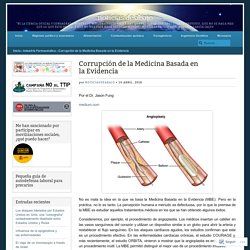
Jason Fung medium.com No es mala la idea en la que se basa la Medicina Basada en la Evidencia (MBE). Pero en la práctica, no lo es tanto. La percepción humana a menudo es defectuosa, por lo que la premisa de la MBE es estudiar aquellos tratamientos médicos en los que se han obtenido algunos éxitos. Consideremos, por ejemplo, el procedimiento de angioplastia. Entonces, ¿por qué destacados médicos han dicho que la MBE resulta en gran medida inútil? “Los argumentos en contra de la Ciencia son sencillos: gran parte de la literatura científica, tal vez la mitad, es simplemente falsa”. La Dra. “Sencillamente, ya no es posible confiar en gran parte de la investigación clínica que se publica, o confiar en el juicio de médicos de confianza o en directrices médicas autorizadas. Esto tiene enormes repercusiones. Miller.pdf. The Rise of Scientific Fundamentalism. Contrary to the beliefs of some, science is not an impenetrable body of settled fact that must be defended at all costs in the name of truth.
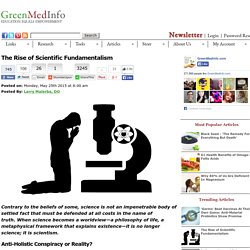
When science becomes a worldview—a philosophy of life, a metaphysical framework that explains existence—it is no longer science; it is scientism. Contrary to the beliefs of some, science is not an impenetrable body of settled fact that must be defended at all costs in the name of truth. It is not a means by which to determine truth or to achieve absolute certainty. Neither is science a worldview. When science becomes a worldview—a philosophy of life, a metaphysical framework that explains existence—it is no longer science; it is scientism. A series of recent events have something peculiar in common.
A Rough Guide to Spotting Bad Science. A Rough Guide to Spotting Bad Science Click to enlarge A brief detour from chemistry, branching out into science in general today.
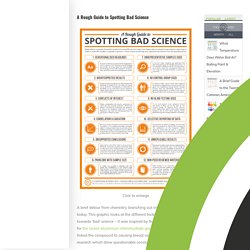
This graphic looks at the different factors that can contribute towards ‘bad’ science – it was inspired by the research I carried out for the recent aluminium chlorohydrate graphic, where many articles linked the compound to causing breast cancer, referencing scientific research which drew questionable conclusions from their results. The vast majority of people will get their science news from online news site articles, and rarely delve into the research that the article is based on. Personally, I think it’s therefore important that people are capable of spotting bad scientific methods, or realising when articles are being economical with the conclusions drawn from research, and that’s what this graphic aims to do.
EDIT: Updated to version 2! Support Compound Interest on Patreon for post previews and more! You can download the previous version as a PDF here. Republished study: long-term toxicity of a Roundup herbicide and a Roundup-tolerant genetically modified maize. "Ni la Ciencia oficial y consagrada ni otra fe ninguna puede hacer más que procurar que se cumpla lo previsto, que no se haga más que lo que está hecho, y que no nos pase nada del otro mundo". Mentiras principales, Agustín García Calvo. Journals. PLOS publishes seven peer-reviewed open-access journals.
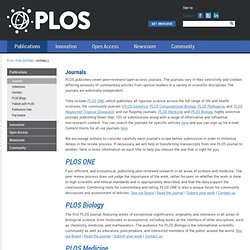
The journals vary in their selectivity and contain differing amounts of commentary articles from opinion leaders in a variety of scientific disciplines.The journals are editorially independent. They include PLOS ONE, which publishes all rigorous science across the full range of life and health sciences; the community journals (PLOS Genetics, PLOS Computational Biology, PLOS Pathogens, and PLOS Neglected Tropical Diseases); and our flagship journals, PLOS Medicine and PLOS Biology, highly selective journals publishing fewer than 10% of submissions along with a range of informative and influential non-research content. You can search the journals for specific articles here and you can sign up for e-mail Content Alerts for all our journals here.
We encourage authors to consider carefully each journal’s scope before submission in order to minimize delays in the review process. The Institute of Science In Society. Liberating Science and Imagination. Politically Correct Science for the Masses. ISIS Report 27/01/14 Real democracy does not just mean the right to vote.
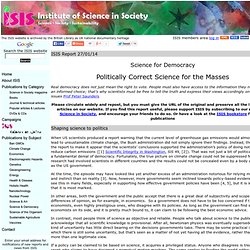
People must also have access to the information they need to make an informed choice; that’s why scientists must be free to tell the truth and express their views accordingly on scientific issues Prof Peter Saunders Please circulate widely and repost, but you must give the URL of the original and preserve all the links back to articles on our website. If you find this report useful, please support ISIS by subscribing to our magazine Science in Society, and encourage your friends to do so. Or have a look at the ISIS bookstore for other publications. ISIS News no.7/8 part35. Book Briefs Captive State: The Corporate Takeover of Britain by George Monbiot, MacMillan, London, 2000.
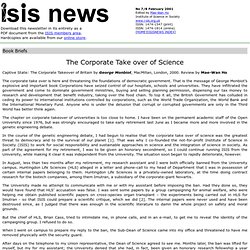
Review by Mae-Wan Ho The corporate take over is here and threatening the foundations of democratic government. That is the message of George Monbiot’s explosive and important book Corporations have seized control of our hospitals, schools and universities. They have infiltrated the government and come to dominate government ministries, buying and selling planning permission, dispensing our tax money to research and development that benefit industry, taking over the food chain. The chapter on corporate takeover of universities is too close to home. In the course of the genetic engineering debate, I had begun to realise that the corporate take over of science was the greatest threat to democracy and to the survival of our planet [1]. In August, less than two months after my retirement, my research assistant and I were both officially banned from the University campus. The Sparc.